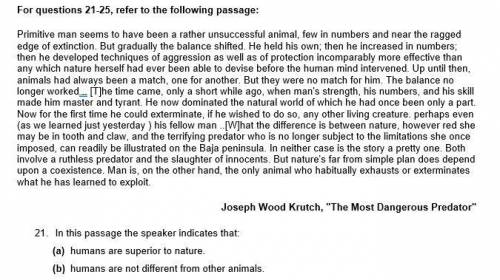
21. In this passage the speaker indicates that:
(a) humans are superior to nature.
(b) humans are not different from other animals.
(c) human have come to oppose principles of nature.
(d) humans, as predators, are ineffectual.
(e) humans, as predators, follow the principles of nature.
22. "Both involve a ruthless predator and the slaughter of innocents" is an example of:
(a) figurative language.
(b) argument.
(c) ethos.
(d) emotionally charged language.
(e) logical fallacy.
23. This passage seeks to create which of the following emotions in its audience?
(a) Fear about overspending natural resources
(b) Disgust at humanity’s selfishness
(c) Desire for a more peaceful way of life
(d) Horror at humanity’s brutality
(e) Charity toward creatures weaker than ourselves
24. The speaker indicates that nature is marked by:
(a) violence.
(b) bounty.
(c) tolerance.
(d) indifference.
(e) absurdity.
25. Which of the following statements would serve as the best counterargument to the passage?
(a) Humans evolved from animals.
(b) Most people would be unwilling to give up their standard of living for the benefit of animals.
(c) The law of nature is "survival of the fittest" (when the strong survive and dominate the weak, it ensures the continuance of all life).
(d) Killing is a basic instinct.
(e) Animals are equal in value and importance to human beings


Answers: 2


Another question on English

English, 21.06.2019 20:00
Read the excerpt from a history of the world in 100 objects. power is usually not willingly given, but forcefully taken; and in both europe and america the nineteenth century was punctuated by political protest, with periodic revolutions on the continent, the civil war in america and, in britain, a steady struggle to widen the suffrage. what would be a benefit of reading this text rather than listening to an audio version of it? the reader could analyze the text features in the excerpt. the reader could visualize the description given. the reader could set his or her own pace and reread parts for clarity. the reader could hear the sounds of the political protest.
Answers: 1

English, 21.06.2019 23:30
Plz (i only understand "the song of wandering aengus." and i have no idea what the raven means so i can't answer this. me i will give brainlest and a 5-star rating) consider the speakers in "the raven" and the speaker in "the song of wandering aengus." write two paragraphs to compare and contrast the voice in these two poems. how does the poet give the speaker in each poem a distinctive voice? what effect does this voice have in each poem? use examples from each poem to as evidence for your answer
Answers: 2

English, 22.06.2019 00:50
3. of all the characters highlighted in the works included in this unit, which one did you relate to or identify with the most in terms of his or her struggles and conflicts? why? what was it about this character that made him or her affect you as he or she did? be sure to point to specific examples from the work to support your response.
Answers: 2

English, 22.06.2019 06:30
Your denunciation of tyrants brass fronted impudence; your shout of liberty and what is the meaning of denunciation as used in this sentence? a) excessive self-assurance b) to deceive, delude, or disappoint c) a ruler who governs without restrictions d) to condemn or censure openly or publicly
Answers: 1
You know the right answer?
21. In this passage the speaker indicates that:
(a) humans are superior to nature.
(b) human...
(b) human...
Questions







English, 23.03.2021 20:10

Business, 23.03.2021 20:10



English, 23.03.2021 20:10



Mathematics, 23.03.2021 20:10



History, 23.03.2021 20:10

Biology, 23.03.2021 20:10

Spanish, 23.03.2021 20:10



